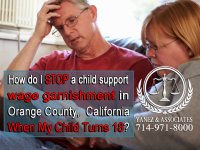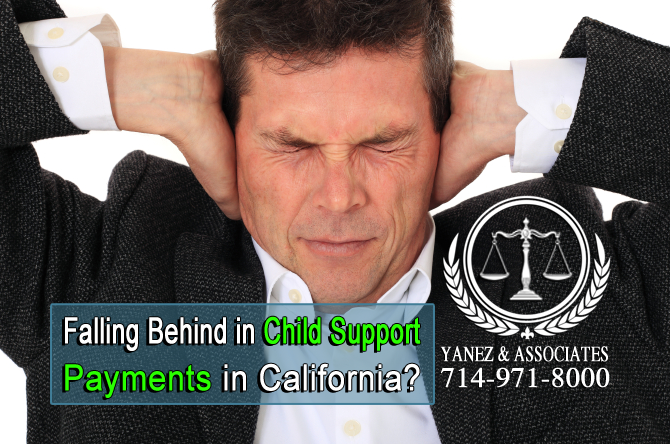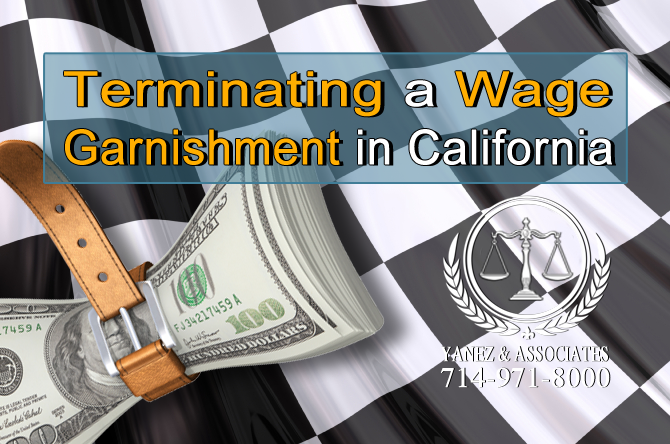FAQ: I have an 18 year old child, How do I end child support wage garnishment in Orange County, California?
How do I stop a child support wage garnishment, When My Child Turns 18?
In California, child support obligations usually end when a child turns 18 and graduates from high school, or turns 19. However, if your wages have been garnished in order to make your child support payments, you can usually terminate the wage garnishments as long as you are caught up on payments. Wage garnishments are standard in all California child support cases; however, parents or the local child support agency may choose to allow payment in another way.
This article will provide a brief overview of child support in California, but is in no way a replacement for quality legal advice. If you are having issues regarding child support in California, it is in your best interests to discuss your situation with a qualified family law attorney.
When Does Child Support End in California?
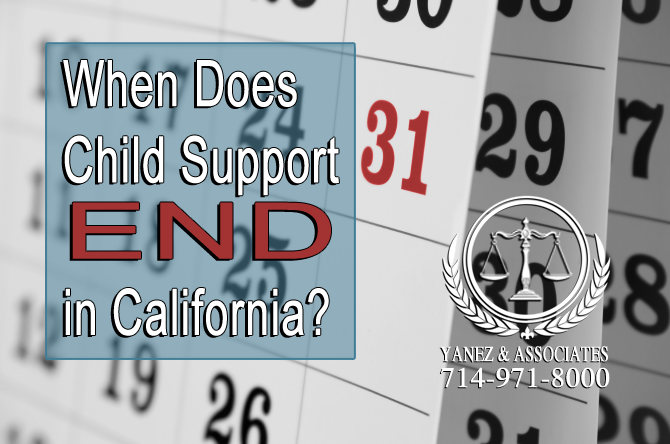
In California, parents are legally required to financially support their children. When the parents are not married, or when they share custody of their child, there is usually a child support order in place to ensure that both parents are supporting their child financially.
There are several situations when child support obligations end in California.
• When a child marries or enters a registered domestic partnership, the child is financially independent and child support may be terminated;
• If a child joins the military, he or she is financially independent and the parents’ child support obligation may be terminated;
• A child who is emancipated is no longer financially dependent on his or her parents, and child support may be terminated;
• If a child dies, child support obligations may be terminated;
• When a child turns 18 or graduates from high school, he or she is considered an adult and child support will usually be terminated, unless the 18 year old is a full time student in high school and still lives with a parent. In this case, when the child graduates from high school or turns 19, child support may be terminated.
In some situations, a child’s parents may agree to provide financial support beyond these situations. A court may also order that parents support a child beyond these situations, especially if a child is disabled or otherwise unable to support him or herself.
Falling Behind in Child Support Payments in California?
When a judge orders you to pay child support, you are legally obligated to do so until one of the above situations occurs. Failing to pay your child support or to pay it on time can have serious consequences.
If you have a legitimate reason that you cannot pay your child support, it is important that you have the child support order modified rather than simply not paying it. Until you have legally modified a child support agreement, you are legally obligated to continue paying it.
If you have failed to pay your child support payments and the court finds that you were able to pay them, you may be held in contempt of court, which can lead to jail time and fines.
California will charge interest on late payments, and current payments will continue to go towards the oldest missed payment rather than towards new payments.
Accounting and Determination of Arrears
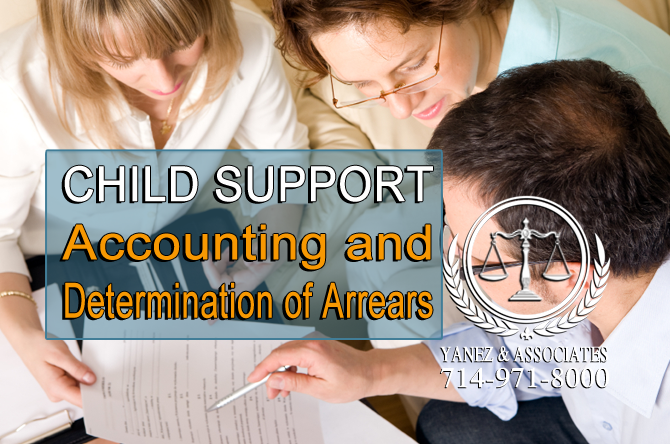
If you do not agree that you owe back child support (arrears), or if you do not agree with the amount of back support that is requested of you, you may ask for accounting for your child support case from your local child support agency.
They are legally required to provide you with a record of what you owe, what you have paid, and how your child support has been distributed.
Following this, if you still do not agree with the amount you owe, you may ask the court for a Determination of Arrears, which will tell you what you legally owe.
Collecting Arrears
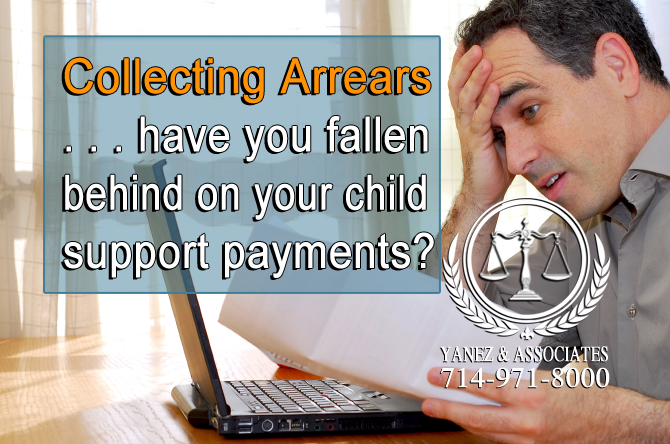
In the case that you have fallen behind on your child support payments, you can be facing some of the following: Credit Reporting, Passport Denial, Property Liens, License Suspension, Franchise Tax Board Child Support Collection, Income Tax Interception... etc.
In the case that you have fallen behind on your child support payments, your local child support agency can do any of the following in order to collect.
• Credit Reporting - If you do not pay your child support, or you do not pay it on time, your local child support agency can report it to the credit agencies, and it will have a negative effect on your credit score.
• Passport Denial - Owing more than $2,500 in arrears can lead the U.S. State Department to deny you a passport, or deny a passport renewal, until all of your past due payments have been made.
• Property Liens - If you own land or a house, your local child support agency can file a lien against it. This means that when you try to sell your property, the amount of past due child support that you owe can be taken from the sale.
• License Suspension - Any license issued by the state can be suspended or withheld in order to collect arrears. These licenses can be for your business, professional licenses, driver’s licenses, etc. If your license is suspended, contact your local child support agency. They are likely to allow a license renewal if you can make an agreement with them as to how you will make payments, and you stick to it.
• Franchise Tax Board Child Support Collection Program - Falling more than $100 or 60 days behind in your child support payments means that your local child support agency is legally required to report your late payments to the Franchise Tax Board. The Franchise Tax Board has the ability to take funds from your bank accounts, commissions, dividends, royalties, and more. They can also seize property in order to collect what you owe.
• Income Tax Interception - Both the Internal Revenue Service and the Franchise Tax Board can take money from your tax refund before it gets to you in order to pay past due child support.
• Banks & Financial Institutions - Money may be taken from banks, savings, loan institutions, or credit unions to make up for missed payments.
• Benefit Interception - Your local child support agency can take funds from disability payments, unemployment benefit, workers compensation awards, or lottery winnings in order to make up for past due child support that you owe.
Wage Garnishments and Child Support in California
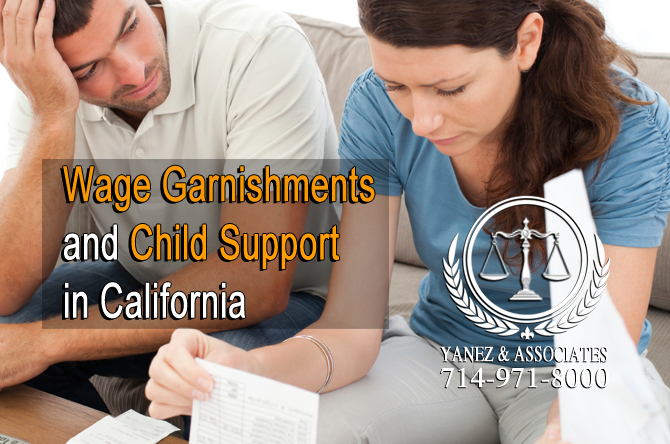
If you have an active wage assignment for your California child support case, your child support payments will be automatically deducted from your wages.
In order to ensure that you pay your child support payments on a monthly basis, the court can order a wage assignment, or wage garnishment. This lets your employer know that he or she should take a certain percentage of your income out of your wages prior to paying you.
This is standard procedure in every child support case in California. However, if you and your child’s other parent can agree that child support payments will be made another way, you can request that this wage assignment be stayed, or temporarily stopped. In this case, you and your child’s other parent will handle child support payments on your own.
However, if you have an active wage assignment for your California child support case, your child support payments will be automatically deducted from your wages.
Basics of Wage Assignments & Child Support
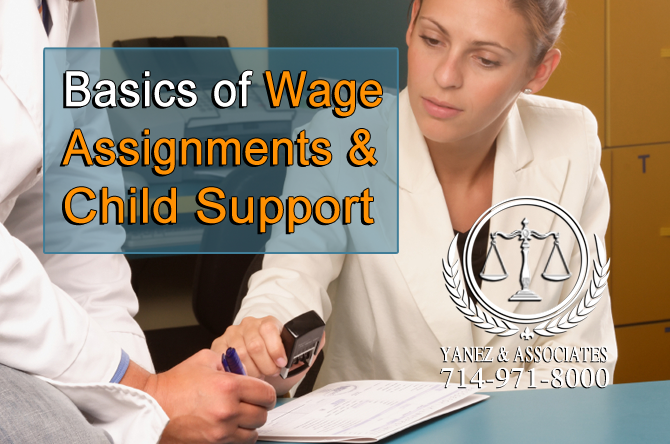
A wage assignment will be served on your employer so that he or she is aware that support payments need to be withheld from your income. From the date that he or she is served, your employer has 10 days to begin garnishing your wages. Your employer must send payments to the State Disbursement Unit, which will then distribute the support payments.
Terminating a Wage Garnishment
If you want to terminate your wage garnishment, one of the following situations must have occurred.
• Your child has passed away,
• Your child has been emancipated,
• Your child turned 18 and graduated from high school, or turned 19,
• Six months have passed since your payments were able to get to the other parent because he or she cannot be found,
• Your child has married or entered a registered domestic partnership,
• Your child has entered the military,
• Another valid reason for ending child support has occurred.
To terminate the wage assignment, you will need to fill out a form called an Ex Parte Application to Issue, Modify, or Terminate an Earnings Assignment Order. In this order, you will need to provide the reason that you believe the wage assignment should be terminated.
In most cases, it will only be terminated if you are caught up and do not owe past due support, and one of the above situations has occurred so that it is appropriate to stop paying child support.
Orange County, California Child Support Attorney
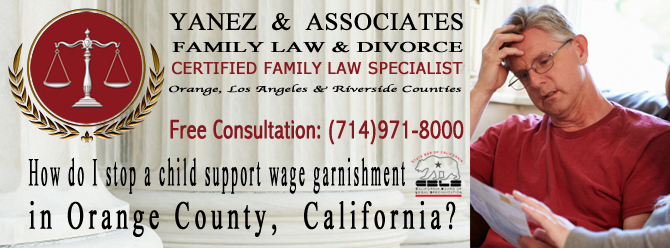
If you have questions about child support, wage assignments, or terminating either child support or wage garnishments related to child support, it is in your best interest to discuss your case with a qualified child support attorney in California.
Contact the family attorneys at Yanez & Associates today to discuss your case - we offer a free initial consultation so that you can get to know us, and we can get to know you and your legal situation.

